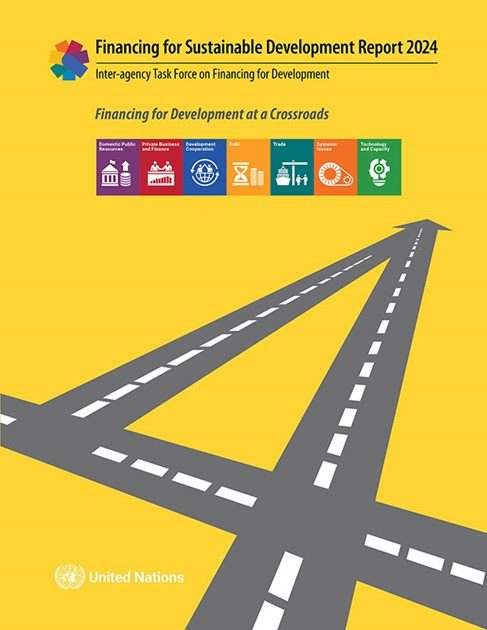The first edition of the IDEAs African Network (IDAN) conference will be held from 26…
Financing for Development at a Crossroads: 2024 Financing for Sustainable Development Report
 The 2024 Financing for Sustainable Development Report: Financing for Development at a Crossroads – of the Inter-agency Task Force on Financing for Development – launched today in advance of the 2024 ECOSOC Forum on Financing for Development.
The 2024 Financing for Sustainable Development Report: Financing for Development at a Crossroads – of the Inter-agency Task Force on Financing for Development – launched today in advance of the 2024 ECOSOC Forum on Financing for Development.
The report finds that the world is facing a sustainable development crisis, and that financing challenges are at the heart of the crisis and imperil the SDGs and climate action. It notes that the Fourth International Conference on Financing for Development in 2025 will be a last chance to correct course if we want to achieve the SDGs by the 2030 deadline. It calls for urgently closing financing gaps through an investment push, for closing policy and architecture gaps to make the international financial architecture fit for purpose in a crisis-prone world, and for closing credibility gaps, translating rhetoric into action to rebuild trust in multilateralism.
To access the full report, policy recommendations and comprehensive and data-rich monitoring of progress, visit: http://financing.desa.un.org/iatf/fsdr2024
The world is facing a sustainable development crisis. The 2024 Financing for Sustainable Development Report: Financing for Development at a Crossroads finds that financing challenges are at the heart of the crisis and imperil the SDGs and climate action. The window to rescue the SDGs and prevent a climate catastrophe is still open but closing rapidly.
Financing gaps for sustainable development are large and growing – the estimates by international organizations and others are coalescing around $4 trillion additional investment needed annually for developing countries. This represents a more than 50% increase over the pre-pandemic estimates. Meanwhile, the finance divide has not been bridged, with developing countries paying around twice as much on average in interest on their total sovereign debt stock as developed countries. Many countries lack access to affordable finance or are in debt distress.
Weak enabling environments are preventing progress. Average global growth has declined, while policy and regulatory frameworks still do not set appropriate incentives. Public budgets and spending is not fully aligned with SDGs. Private investors are not incentivised to invest enough in SDGs and climate action.
The world is at a crossroads. This is the last chance to correct course if we want to achieve the SDGs by the 2030 deadline. Only an urgent, large-scale and sustainable investment push can help us achieve our global goals. Next year’s Fourth International Conference on Financing for Development in 2025 will be a once in 80-year opportunity to support coherent transformation of financing. Four actions are needed:
- Close financing gaps for SDG/climate investments (both public and private) at scale and with urgency;
- Close policy and architecture gaps, and reform international institutions;
- Close credibility gaps and trust deficits both international and domestically; and
- Formulate and finance new development pathways.
The 2024 FSDR is the ninth report on implementing the Financing for Development outcomes and the means of implementation of the Sustainable Development Goals since the adoption of the 2030 Agenda for Sustainable Development and the Addis Ababa Action Agenda in 2015. The assessment draws on the expertise, analysis and data from more than 60 agencies and international institutions that make up the Task Force, which is led by UN DESA and includes the World Bank Group, the International Monetary Fund and the World Trade Organisation, as well as UN agencies such as UNCTAD and UNDP.
We hope you will read the report and make use of the full depth of data and analysis.
For further information on the report or the Task Force, please contact: developmentfinance@un.org
